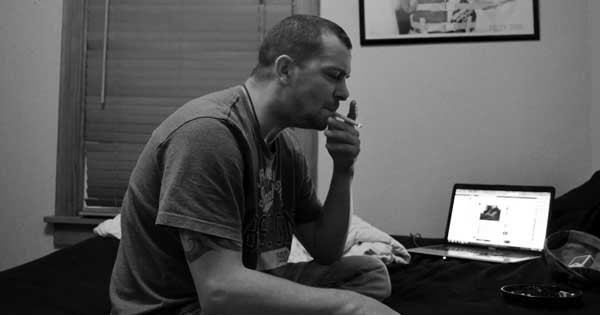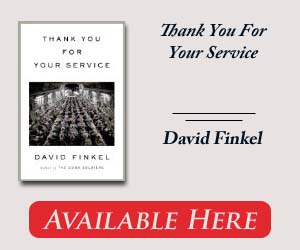
Thank You for Your Service, by David Finkel, Sarah Crichton Books/Farrar, Straus and Giroux, 256 pp., $26
Nothing is quite so invisible as the last war. Already the war in Iraq, despite its length and expense, has been thoroughly scrubbed from our national conversation. Perhaps this isn’t surprising. Americans don’t like obstacles. Great rivers, mountain ranges, irritating nations—in the American dream all such things must be bridged, solved, the rough places made plain. War wrecks this momentum. It traps minds, bodies, families. It erodes economies and freedoms. War clings like tar, and can be endured only so long. Then it must be finished and forgotten.
Why the United States invaded Iraq and what was (or wasn’t) accomplished there are questions too painful and problematic to reflect upon. But war’s grave problems are not easy to escape. Even if talking about it hurts or embarrasses, the war has not really ended. What has changed is distance. Our troops no longer battle on searing Baghdad streets. Instead, they die and nearly die and carry on or don’t here at home, where the war still churns, so close we no longer see it.
In Thank You for Your Service, David Finkel finds the war in the American heartland, where it is now the private struggle of a small subcaste: Iraq veterans and their families. An editor with The Washington Post, Finkel wrote about Iraq in The Good Soldiers (2009), a narrative of one infantry battalion’s experience in Baghdad during the conflict’s worst years. Thank You for Your Service is the next piece in his documentary journey, but it isn’t necessary to read the first book before approaching the second. Finkel begins with a brief prologue taken from the earlier work that sketches the mental collapse of a staff sergeant named Adam Schumann during his third tour of duty. Schumann, silhouetted against bodily tremors, bottles of pills, and, we assume, black memories of battle and death, recognizes his need for help and manages to seek it. He is sent back to the States, alone and ashamed, as his comrades move on with the war.
The new book then leaps two years forward. It is 2010, and Schumann lives with his wife, Saskia, and their two children on the outskirts of Fort Riley in central Kansas. He has been shunted around a medical system that does not really know how to treat his wounds. He has prescriptions. He has the stillness of the soybean fields. He has the laughter of his daughter, the hollow ease of American life. None of it has restored him. He has trouble keeping jobs. He still tastes the blood of a soldier whose life he saved, still dreams of those he could not. He has been so debased by festering psychological injuries that when he falls asleep holding his newborn son, trouble is almost expected. The “great Sergeant Schumann,” once entrusted with men and honor, a hero by any measure, now cannot maintain even this small watch in the night. The baby rolls out of his arms. He wakes to Saskia’s screams. “He says nothing,” Finkel writes. “There is nothing he can say. He is sorry. He is always sorry now. He has been sorry for two years, ever since he slunk home from the war.” Their son seems unharmed after the fall, but Saskia, pushed to breaking by her broken husband, may not recover. Adam, exiled in suffering, thinks of suicide. The “after-war,” Finkel shows, may yet claim them all.
Many, perhaps most, of the two million men and women who volunteered and served in Iraq or Afghanistan “describe themselves as physically and mentally healthy,” as Finkel notes. Not every service member returns carrying Schumann’s guilt and stress. But this book is about those who have. Finkel focuses on the estimated 20 to 30 percent of Iraq and Afghanistan veterans who suffer from various forms of posttraumatic stress disorder, PTSD. “How to grasp the true size of such a number?” he asks. “One way would be to imagine the five hundred thousand [people] in total, perhaps as points on a map of America, all suddenly illuminated at once. The sight would be of a country glowing from coast to coast.”
The Schumanns are central to Finkel’s book, but arranged around them are other characters, all of them linked, most of them sifting through the rubble of war-crushed lives. Finkel’s ability to gather material from deep within the lives and minds of his characters and to present questions, emotions, and decisions from many perspectives pushes his narrative onto a higher and more difficult plane than the mere journalistic delivery of facts.
In Thank You we see long-suffering wives asking, in moments of exasperation, why their husbands can’t just “man-up” and step out of the war’s shadow. We see the soldiers asking this of themselves. One of the most intense and disturbing ideas presented in the book is that all of its characters are fighting the after-war in solitude. Like the war itself, they too are invisible. Resonating most strongly with me were the voices of women. When Saskia Schumann is told, as countless wives have been told, to “Stay strong, you’re a soldier’s wife,” she says it “makes me want to puke.” She has been strong for years already. When does it end? Will things ever get better?
 Finkel rightly omits politics from his narrative. He does not dig into the causes of the Iraq war or its execution. He does not lecture about collective responsibility or chasten Americans for the great shrug that has become their common gesture toward the conflict. The closest Finkel comes to political forensics is when he examines the after-war from the perspective of General Peter Chiarelli, who served several years as the Army’s vice chief of staff. From this position near the top of the Pentagon hierarchy, Chiarelli was, as he once told me, in charge of “the care and feeding of the Army.” Finkel sympathetically describes some of Chiarelli’s efforts. The general tried to check the alarming spike in soldier suicides. He presided over solemn, hours-long meetings seeking out the “lessons learned” from each suicide, so that other soldiers might be saved. But the general, so far up the chain of command he might well have been watching from the moon, works within a military still deeply suspicious of wounds that cannot be sewn up. “I’ve got to try to change the culture,” the general laments. But it is too big a job. Chiarelli is more a veteran of the Cold War than Iraq, and he admits he can only attempt to influence future leaders. By the book’s end, he has retired. In the waning years of his service, “a billion-dollar industry” has mushroomed around the wounded, but the military’s primary mission has never been to heal. The hope that meaningful change will trickle down to earth in time to help the Adam Schumanns seems remote.
Finkel rightly omits politics from his narrative. He does not dig into the causes of the Iraq war or its execution. He does not lecture about collective responsibility or chasten Americans for the great shrug that has become their common gesture toward the conflict. The closest Finkel comes to political forensics is when he examines the after-war from the perspective of General Peter Chiarelli, who served several years as the Army’s vice chief of staff. From this position near the top of the Pentagon hierarchy, Chiarelli was, as he once told me, in charge of “the care and feeding of the Army.” Finkel sympathetically describes some of Chiarelli’s efforts. The general tried to check the alarming spike in soldier suicides. He presided over solemn, hours-long meetings seeking out the “lessons learned” from each suicide, so that other soldiers might be saved. But the general, so far up the chain of command he might well have been watching from the moon, works within a military still deeply suspicious of wounds that cannot be sewn up. “I’ve got to try to change the culture,” the general laments. But it is too big a job. Chiarelli is more a veteran of the Cold War than Iraq, and he admits he can only attempt to influence future leaders. By the book’s end, he has retired. In the waning years of his service, “a billion-dollar industry” has mushroomed around the wounded, but the military’s primary mission has never been to heal. The hope that meaningful change will trickle down to earth in time to help the Adam Schumanns seems remote.
Finkel himself does not appear in the book, but readers will sense his presence behind his keen observations and distilled prose. In a few places, he reaches too hard for irony or allows the intrusion of something like tinny sarcasm. But these are small criticisms. Finkel has said that he never planned to write this book. It became clear to him only after he had traveled through the war. That he recognized the need to tell these stories, and that he could do it so well, is immensely important. In my experience, it is far simpler to write about combat. I have covered the wars in Iraq and Afghanistan and have always retreated from writing much about the after-war. It seemed too big, too hard. And there is another subtle fear that those of us who have seen it share with those who haven’t: on some level we know war is a contagion. We don’t want to get too close.
Thank You for Your Service is a hard book, but it is not without hope. Eventually Adam Schumann finds a treatment program that offers him his best chance at recovery. The program is not run by the military, but privately funded. Another soldier, grievously wounded, considers his saved life a second chance to do better. A female civilian employed by the Army works harder than anyone else to help the men in her care, and a sergeant sits on a bridge above the river where he intends to kill himself—then relents, recognizing he can still help other soldiers. Finkel’s story would be incomplete if it portrayed only collapse. Instead, he describes a chaos from which many things may emerge, including an end to the after-war. But not yet, and not soon.
An uncomfortable challenge is contained in the book’s title, printed atop every other page. What do we mean when we say “Thank you for your service”? Finkel quotes President Obama, who while presenting the Medal of Honor to a soldier says that our troops represent “the very best part of us.” Do we really believe this, and if so, does repeating it in public make for genuine gratitude? Is a clumsy, billion-dollar healing industry the embodiment of our thanks? If freedom isn’t free, who pays, and how much? Finkel reminds us that we still have not worked out the math.

